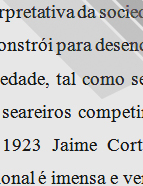

................................
As is often read in the essays of António Sérgio (always referencing Goethe), “writing history is a way of freeing ourselves from the past.” Only thus can we shed the burden that the past has condemned us to.
For in Sérgio 's view, throughout the course of Portuguese history, “parasitism” had always been dominant : “the hunting of the Moorish infidel formed our nationality, the hunting of the black infidel incited the discoveries, and the hunting of the savage infidel was our profession in Brazil.” Furthermore, “ Some of the dead need to be kill ed — historical Portugal is one of them.” (Samuel, The Renaissance, p. 158).
However, the purpose of social and political, and especially cultural reform that had already brought together intellectuals in the “Portuguese Renaissance” from 1912 onwards (and later the seareiros from 1921 onward s) did not result in a single unified vision of the past among these protagonists-interpreters. Jaime Cortesão responded, rejecting the pessimism that appeared to overshadow many of his contemporaries' views of the past: “We were great through our work and honesty, through our thought and valour, and great through the originality and brilliance of our genius. Today we are not great because we are denationalised.” (Samuel, The Renaissance, p. 151). These words, spoken in 1913, appear to contrast with Sérgio’s perspective, at a time when neither the future historian nor the budding essayist knew much about history... Because what inspired the poet Jaime Cortesão before the war was mainly the thought expressed by Teixeira de Pascoaes in his programmatic writings supporting the intended and indispensable Portuguese renaissance: The Espírito Lusitano [or Saudosismo L usitanian Spirit or Saudosismo] (1912) and A Arte de Ser Português [The Art of Being Portuguese] (1915) — convinced that they contained "the good, sound Portuguese doctrine." (Pascoaes, Art, p. 7). These were writings of an imaginary para-history, laden with fantastic argumentation. However, Jaime Cortesão, his companion, was already turning toward ethnography and the rigo u r with which Leite de Vasconcelos, Tomaz Pires, Carolina Michaëlis de Vasconcelos, Teófilo Braga, and others were approaching it, as diffused by the Revista Lusitana. This led to his Cancioneiro Popular [Popular Songbook] — an anthology preceded by a critical study (1914). Albeit with some inflection, saudade — “deli quescent nostalgia ,” wrote Sérgio cuttingly and provocatively (Sérgio, Correspondence, p. 33) — still emerged as being central to the theoretical construction of whatever was meant by the Portuguese spirit in this work that sought to reach the “knowledge of the latent energies in the depths of the soul of the people.” (Cortesão, Popular Songbook, p. 9). But from early on, Cortesão understood that it was necessary to seek in “historicism” " the virtues of the national genius to adapt them to the modern struggle ". (Samuel, The Renaissance, p. 151).
